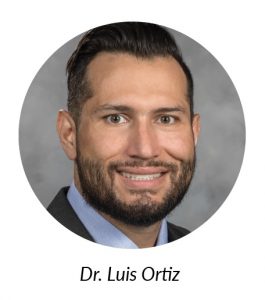Dr. Luis Ortiz always knew he wanted to be a doctor when he grew up – it was only a matter of getting into school and picking a field. He thought maybe surgery – picturing his future self working long hours in sterile operating rooms, operating long into the night. But Dr. Ortiz’s body had a different plan. 
His parents had always noticed his sleepiness. Beginning around the age of ten, Dr. Ortiz frequently nodded off at school, while doing homework or even just sitting watching tv. But visits to his pediatrician and medical tests couldn’t find any cause. A bright and avid student, he managed to do well in school, oftentimes “reading far ahead in the textbooks,” so he would always have an answer ready when called on. He may have fallen asleep a lot in class, but he did so well in school, who could really worry?
It wasn’t until college that Dr. Ortiz’s excessive sleepiness finally caught up to him. With the increased demands of a full class load, extracurriculars, and a busy social schedule, there suddenly wasn’t enough time in the day. His grades plummeted, and suddenly his dream of becoming a doctor was in serious jeopardy. Devastated, he withdrew from his classes and arranged for a lighter course load so he could get back on track. Fortunately, one of those classes happened to be Introduction to Abnormal Psychology.
A Sudden Insight
One afternoon Dr. Ortiz was flipping through his textbook, reading ahead as he often did to prepare. Suddenly, he happened upon a vignette about narcolepsy. In the story, a man was described as being sleepy since childhood, of falling asleep while studying, socializing, and working. There was also a description of a collection of symptoms known as cataplexy: sudden loss of muscle tone that some patients with narcolepsy experience. Stunned, Dr. Ortiz thought to himself “That’s ME!”
A visit to a Sleep Medicine specialist and sleep studies quickly confirmed the diagnosis. Dr. Ortiz had Narcolepsy, a rare but not unheard of sleep disorder which often begins in childhood and generally persists for life. The mystery of his sleepiness was solved.
A Long Road Forward
The diagnosis may have been made, but Dr. Ortiz still had challenges ahead. Although there have been many advancements in the understanding and treatment of narcolepsy, Dr. Ortiz emphasizes that it is very important for patients to have “realistic expectations for treatment. Sometimes people think once they are treated they will be superhuman, and accomplish everything! That’s just not realistic for anyone.”
The most common treatments for narcolepsy are long-acting stimulants, but medications like SSRI antidepressants and drugs that can help control cataplexy are also used. Regardless of which treatment is utilized, most patients will have to work closely with their sleep doctor to find the treatment that works best. And that treatment can change over time!
Non-pharmaceutical treatments are just as important as medication for managing symptoms. For Dr. Ortiz that can mean taking naps when needed, adding movement into his day, and making sure to have a consistent sleep schedule.
“My life was changed when I received the correct diagnosis.”
The Future is Bright
Dr. Ortiz was successful in realizing his dream of becoming a physician, though ultimately he decided that surgery wasn’t a good fit given the inevitable sleep deprivation. At first he hesitated to go into Sleep Medicine, but ultimately he has found it very rewarding to care for patients with similar disorders to himself. When asked for tips on managing a chronic illness in the academic and professional worlds, Dr. Ortiz encourages people to be upfront with their supervisors and colleagues. “Let them know what’s going on and what accommodations you will need to do your best.”
Dr. Ortiz notes that our society still “has a long way to go in order to appreciate the importance of getting good rest,” and that he hopes that telling his story will help other people who may be suffering from sleep issues. “Everyone benefits from increased education, especially teachers and parents. My life was changed when I received the correct diagnosis.”
For more information on Narcolepsy and its treatment, Dr. Ortiz recommends wakeupnarcolepsy.org and project-sleep.com.
Dr. Luis Ortiza is a physician in the Sleep Center at Johns Hopkins All Children’s Hospital. He specializes in narcolepsy, hypersomnia, obstructive sleep apnea, and skeletal dysplasias.
……………………………………………………………………………………………………………………………………………………………………………………………………………………………………………..
Rosei Skipper, MD completed her Psychiatry residency and Child fellowship at the Mayo Clinic in Rochester, MN. She is currently pursuing further training in psychoanalytic therapy.



